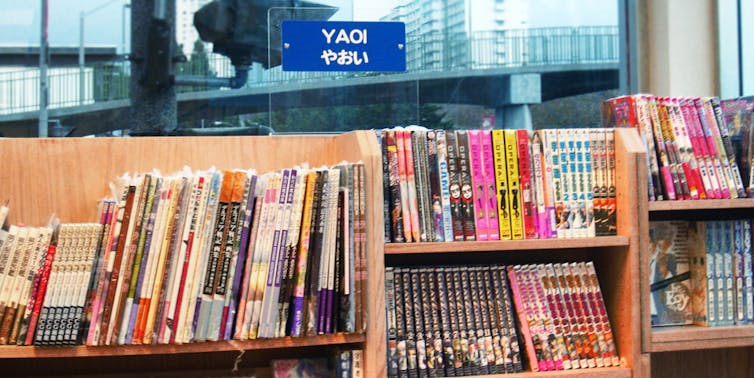China’s arrests of boys’ love authors does not equate to a ‘gay erotica’ crackdown
- China’s recent arrests of boys’ love authors have been misinterpreted by Western media as a “gay erotica” crackdown, when in fact it’s a localized phenomenon related to online content regulation.
- The term “boys’ love” (BL) refers to a genre of East Asian literature that typically features romantic or erotic relationships between men, written by women for a female readership, and is not equivalent to Western-style gay erotica.
- China’s government wants to control the online reading sector, which generates significant profits and has cultural “soft power” potential, but also considers certain types of content, including boys’ love literature, as “unhealthy” or obscene.
- The arrests are likely related to the fact that some authors have been paid for their work on websites outside China’s jurisdiction, where they can publish more explicit content, and then remit those earnings back into the country, potentially breaking Chinese obscenity laws.
- Western media often fails to report on these cases, which raises concerns about censorship and the lack of transparency in China’s justice system, with some cases simply disappearing from public view after receiving significant attention.

Western media was quick to report on the subject of the latest “crackdown” in China: a writing genre known as “boys’ love.”
News articles in the U.K. and U.S. reported “mounting public anger” over the “stifling” of “gay erotica” and the “amateur writers who earned little to nothing for their work.”
Chinese media, too, has been paying attention to these events – but the picture that emerges is less of a sweeping crackdown and more a localized phenomenon.
A lengthy June 20, 2025, article in Nanfang zhoumo, or “Southern Weekly” – an influential and respected media outlet based in Guangzhou – goes into considerable detail describing the recent arrests by police in the northwestern city of Lanzhou.
It reports that authorities detained several young women accused of profiting from the publication of obscene material, specifically online fiction in the genre of “danmei,” or “boys’ love.” The article also references a similar spate of arrests last year in Jixi county of Anhui province.
But nowhere does the article mention that these arrests are representative of anything happening across the whole of China. Instead, the article goes into detail about the legal issues around attempts by the Lanzhou police force to arrest individuals outside their local jurisdiction.
As someone who studies Chinese online culture and its regulation by the Chinese government, I have noticed that headlines starting with “China cracks down on …” are common in Western media. In the past few years, there’s been similar reporting about “crackdowns” on online influencers, celebrity culture and “sissy” boy bands.
Such reporting serves a purpose: Attributing all censorship to “China” rather than to a specific office or location within the vast country strengthens the common belief in the West that China is one, big totalitarian entity. Sometimes that is accurate, but often there is more to the story.
Gay themes, straight audience
Yes, Western media does generally enjoy more freedom than Chinese media. But that does not mean that Western outlets always exercise that freedom. And not every Chinese “crackdown” is what it seems.
Take the arrest of female writers of boys’ love fiction. The headlines in the West would make it seem that the crackdown is driven by homophobia. This may be true, but calling this type of fiction “gay erotica” is not accurate.
Stories and novels featuring romantic or erotic relationships between men, authored by women for a readership that is also largely female, have appeared in various forms around the world for decades.
The term “boys’ love” – “BL” for short – is usually used to describe the East Asian variety of this literature.
The genre has been around at least since the late 1990s and has gained in popularity over the past two decades.
Boys’ love fiction is typically written by women and read by heterosexual women. That fact has sparked extensive discussion, both among scholars and among practitioners and fans, about the extent to which calling it gay erotica is appropriate.
One argument against this labeling is that erotic fiction about male homosexuality actually written by gay men for a gay male readership tends to look very different. Boys’ love stories tend to present an idealized and unrealistic version of gay male sexual relations.
Indeed, Bucknell University East Asian studies scholar Tian Xi has argued that “homosexualizing” boys’ love fiction is problematic, as it reflects heterosexual women’s fantasies rather than the lived experience of gay men. Others have gone further, labeling boys’ love “anti-gay.”
In China, the conflation of boys’ love with homosexuality has, to some extent, given more social visibility to the gay community there. But it is doubtful that the women who were arrested this time would all agree to the label “gay erotica” to characterize their writing – which poses the question: Why does Western media do so in its reporting of the crackdown?
Books are big business
So why are writers of this type of fiction being arrested in China?
Online fiction is big business in China, and Beijing has an economic and ideological interest in controlling the sector.
Large, Chinese-based commercial websites such as Qidian and Jinjiang Literature City offer access to novels across a range of popular genres. The most popular authors in this format have made millions of dollars from not only subscriptions, but also the sale of their intellectual property to the makers of online games and TV series.
According to a recent report compiled by researchers from the Chinese Academy of Social Sciences, there were more than 36 million works of literature available on Chinese websites in 2023, including 4 million or so that had been published that year.
The online reading sector was worth around US$5.5 billion, while the market for the intellectual property derived from online fiction was worth some $27.5 billion.
In short: Chinese literature generates big profits, creates jobs and provides entertainment. The Chinese government wants to support it and also sees it as a potential source of cultural “soft power” to rival Japanese manga or South Korean boy bands.
Porn: A scourge of capitalism
But from the Chinese government’s perspective, boys’ love literature – which consistently ranks as one of the most popular genres, if not the most popular – poses a problem.
For ideological reasons, Chinese authorities want to suppress what they consider “unhealthy” or obscene content, even if it sells well. All types of pornography, gay and straight, are considered a scourge of capitalism for which there should be no place in socialist China.

Wikimedia Commons
For the past few years, authorities have been successful in strong-arming the largest websites into monitoring their own content to make sure that anything erotic is significantly toned down, to the extent that boys’ love fiction has disappeared from all of those sites, even if the genre can still be found hidden in other categories.
However, there is little that the Chinese government can do to prevent aspiring Chinese erotica authors from publishing their writings on websites outside its jurisdiction.
Disappearing cases
Problems can arise for boys’ love writers when they get paid for their writing, and those payments are then remitted back into the country. The recent arrests, for example, appear to have involved women who had published their work on the Haitang portal in Taiwan and had received income from those works.
Haitang is known for publishing much more explicit boys’ love fiction than what can be found on websites in mainland China. The works in question were probably considered obscene by Chinese authorities, and citizens who earn money from obscene publications are breaking Chinese obscenity laws.
In China, commentators tend to see these laws as outdated, both because of the severity of the prescribed punishment – up to 10 years in prison – and because the amounts of profit considered illegal are based on income levels from the 1980s.
As the Southern Daily article points out, doubts about the quality of the legislation in these cases have often prompted judges to impose minimum sentences, as well as many sentences being reduced on appeal.
But significant gray areas persist. Cases that attract too much media attention, including attention from Western journalists, often suddenly disappear from the radar. That’s what happened back in 2018, when a woman writing under the pseudonym Tianyi and her publisher were sentenced to more than 10 years in prison for fairly minor profits made on the sale of a printed novel deemed to be “obscene” by authorities in Anhui province.
The case drew a lot of criticism in China. Western media was also all over it. But
what Western media failed to notice was that, only one month later, an appeals court hearing was held. Because of the huge attention the case had received inside China, the hearing was livestreamed and watched by more than 2 million people, but seemingly not by a single Western journalist.
They saw the prosecutor admit that procedural mistakes had been made in the original trial and ask the judge to remand the case back to the lower court.
Chinese media widely reported this turn of events. But after that there was silence. Was the sentence changed? Did Tianyi and her publisher ever go to prison? We don’t know.
This is the type of censorship that I find genuinely concerning and that deserves much more attention – the cases that suddenly go silent and disappear from the pages of both Western and Chinese media outlets.
![]()
Michel Hockx does not work for, consult, own shares in or receive funding from any company or organization that would benefit from this article, and has disclosed no relevant affiliations beyond their academic appointment.
